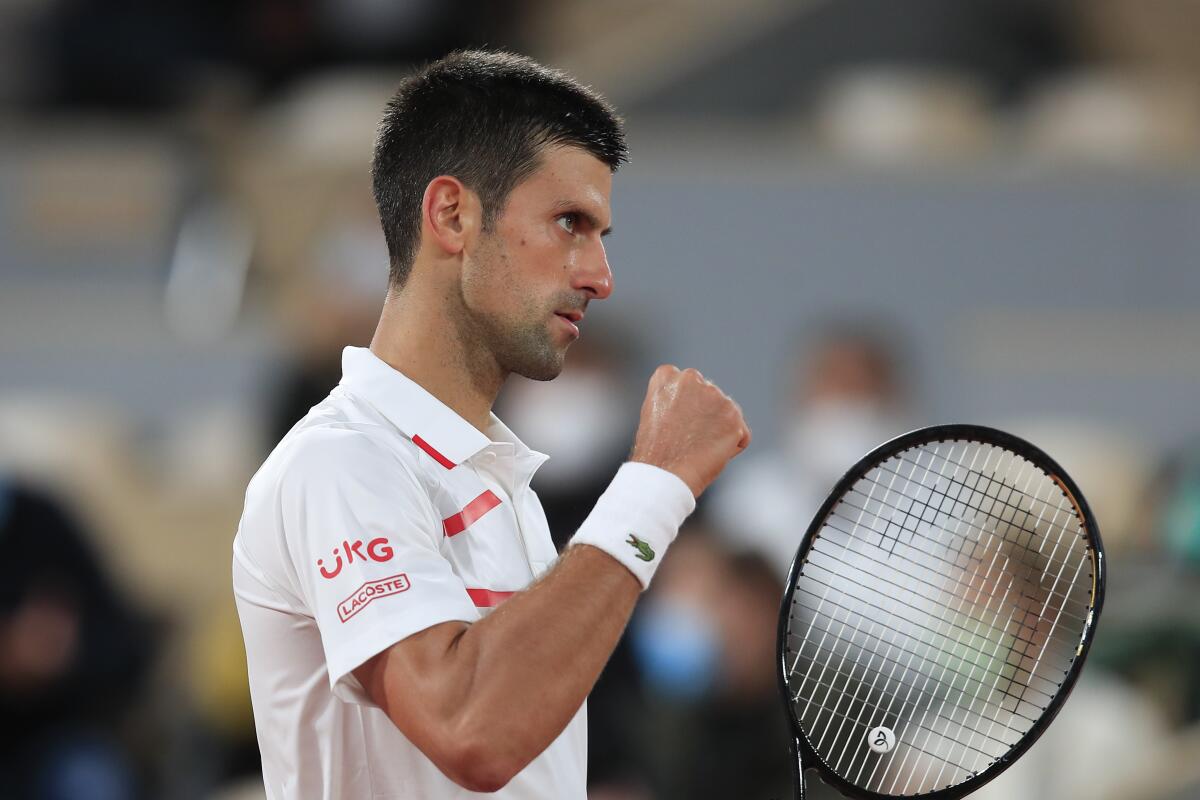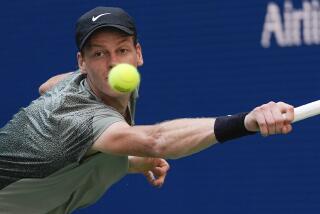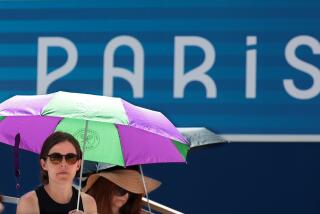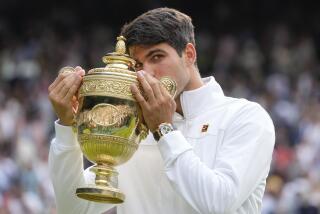French Open: Novak Djokovic near flawless in first round

- Share via
PARIS — Novak Djokovic’s backhand clipped the net and landed wide, so he shook his head. That was it.
Later, a too-soft drop shot found the white tape and bounced back on his own side, finally ceding a game in a dominant debut performance at the 2020 French Open. Djokovic simply bowed and walked to the sideline.
And when he flubbed yet another drop shot — he kept using them on the slow red clay during a 6-0, 6-3, 6-2 win over 80th-ranked Mikael Ymer — and got broken Tuesday, Djokovic pulled an extra tennis ball out of his pocket and merely gave it a gentle tap with his racket strings.
The ball landed right behind him, safely in the middle of the court.
Playing his first Grand Slam match since his U.S. Open disqualification for smacking a ball after dropping a game and accidentally striking a line judge in throat, Djokovic never really gave himself reason for histrionics or shouts of dismay or displays of anger. Sure, there was some eye-rolling and one sarcastic kiss directed at one of the few fans on hand under the roof at Court Philippe Chatrier.
But otherwise, what was there for Djokovic to be disturbed about?
“I just felt very suffocated out there. It’s just corner, corner; very, very rarely miss. His position is unreal in the court,” Ymer explained.
“You know how the snake kills its prey?” Ymer said, pantomiming a boa constrictor’s attack by bringing his arms around and putting his hands together. “That’s a little bit how I felt being out there.”
Ymer said he didn’t pay any attention to Djokovic’s mood or energy.
And Djokovic, for his part, said that what happened in Flushing Meadows was of no concern to him, either, as he began his pursuit of a second title at Roland Garros and 18th Grand Slam trophy overall.
“I have not had any traces of New York in my mind. I’m over it. Honestly forgot about it. I’m not thinking about it,” the No. 1 seed said after improving to 32-1 in 2020, the only blemish being that fourth-round default this month.
“Winning a 6-love first set is the best possible way to start a Grand Slam,” he said. “This is exactly what my intentions will be — trying to get off the blocks very strong, with a good intensity, obviously, because players in the early rounds have nothing to lose.”
Maybe that’s why 17-year-old Clara Tauson of Denmark was able to earn her first tour-level win by knocking off U.S. Open semifinalist and No. 21 seed Jennifer Brady 6-4, 3-6, 9-7.
Or why No. 19 Alison Riske and No. 26 Donna Vekic also lost.
With Dominic Thiem, the U.S. Open champion and two-time French Open runner-up, watching from the stands in a black winter coat, Djokovic broke Ymer nine times and ended up with a 32-12 edge in total winners.
And when Djokovic did have a rare misstep, dropping a service game to make it 2-all in the second set, he responded in a constructive way: improving his play.
Eighteen minutes and four near-perfect games later, the set belonged to him.
“The way he’s playing,” observed Australian Open champion Sofia Kenin, “he’s unbeatable.”
She found herself in quite a tussle but got through it, struggling a bit when a rain delay interrupting things after the first set, but emerging with a 6-4, 3-6, 6-3 victory against 125th-ranked Liudmila Samsonova.
“Just relieved,” the fourth-seded Kenin said.
Others feeling that way on Day 3 at the year’s last Grand Slam tournament included No. 2 seed Karolina Pliskova, who came back to beat 172nd-ranked qualifier Mayar Sherif 6-7 (9), 6-2, 6-4; and the two men who were finalists at the Hamburg tuneup event that ended Sunday, No. 5 Stefanos Tsitsipas and No. 13 Andrey Rublev.
Both dropped the first two sets before coming back to win. Tsitsipas trailed Jaume Munar before advancing 4-6, 2-6, 6-1, 6-4, 6-4, while Rublev knelt on court and covered his face with his hands after turning things around to beat Sam Querrey 6-7 (5), 6-7 (4), 7-5, 6-4, 6-3.
Querrey led the third set 5-2 and served for the victory at 5-3 but let things get away from him.
“I went 0-4 in serving out sets. I would like to think that will never happen to me again. It’s probably never happened,” Querrey said. “Someone with my serve, I can’t let that happen.”
Another American who played a five-setter, Marcos Giron, did pick up a win, edging Quentin Halys 7-5, 3-6, 6-7 (5), 7-5, 8-6 to become the eighth U.S. man to reach the second round.
That’s the most in Paris since nine got that far in 1996.
Last year? One did.
More to Read
Go beyond the scoreboard
Get the latest on L.A.'s teams in the daily Sports Report newsletter.
You may occasionally receive promotional content from the Los Angeles Times.










